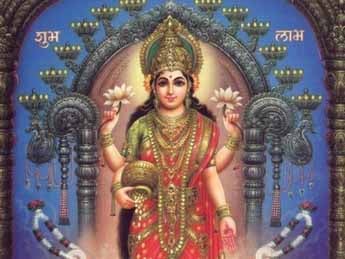Considered a saint during her own life, Dokka Sitamma (1841-1909 C.E.) spent years feeding the poor and sick in her Indian village. After her death, the holy woman was lauded throughout India as "Apara Annapurna"- an incarnation of the goddess Annapurna.
Excerpted from Wisdom's Blossoms: Tales of the Saints of India with permission of Shambhala Publications.
Everyone in Andhra Pradesh knew Dokka Sitamma, and everyone had an opinion about the elderly widow.
To the superstitious, Sitamma was an omen of bad luck because she, like all widows, was responsible for the death of her husband. To those blinded by caste and custom, she was an impudent old woman for refusing to remain confined to her house as a Brahmin widow should. But to the destitute and the devout, Sitamma was mercy personified, for she unfailingly fed the hungry. With no children of her own to care for, and a heart overflowing with motherly love, Sitamma adopted the poor as her sons and daughters. "This illiterate moron is doing great harm by inviting those of a lower station into her home," sniffed the orthodox Brahmins, and when their condemnation failed to deter her, they took to humiliating her. Though the calumnies and threats and loneliness stung her, in the end they were little to one whose heart sung of compassion and love. "Come in! Come in! I have just finished cooking and was hoping that you would join me for dinner tonight." Sitamma would quickly say this to those who came to her in need, thus sparing them the humiliation of having to beg for food. Because of the chicanery of some unscrupulous neighbors who despised her ministry and prized her fertile fields, she found her large holdings reduced year after year until she was left with a small plot of land. A famine came and still Sitamma never turned away those in need, somehow managing to make her shrinking supplies feed a growing stream of hungry souls. And even when she had little to eat, she remained grateful for the opportunity to serve, for it gave her joy and feeding the poor was her chosen path to salvation. One night after working in the kitchen for many hours, Sitamma thought: `I have served four decades and now my body has become worn out. I am nearing the end of my life. It is time for me to go to Varanasi. There I may pass away in peace with the Lord's name on my lips.' For the last few years, Sitamma had dreamed of going to the holy city, for to die there was to be assured of liberation. Every time she set out, however, a desperate arrival or a traveling pilgrim prevented her from leaving. So she would return to her cooking and chanting, putting aside the only desire she had for herself, a desire that daily grew more powerful. But tonight she knew that the hours of her life were few and that only a handful of tomorrows remained.
Excerpted from Wisdom's Blossoms: Tales of the Saints of India with permission of Shambhala Publications.
Everyone in Andhra Pradesh knew Dokka Sitamma, and everyone had an opinion about the elderly widow.
To the superstitious, Sitamma was an omen of bad luck because she, like all widows, was responsible for the death of her husband. To those blinded by caste and custom, she was an impudent old woman for refusing to remain confined to her house as a Brahmin widow should. But to the destitute and the devout, Sitamma was mercy personified, for she unfailingly fed the hungry. With no children of her own to care for, and a heart overflowing with motherly love, Sitamma adopted the poor as her sons and daughters. "This illiterate moron is doing great harm by inviting those of a lower station into her home," sniffed the orthodox Brahmins, and when their condemnation failed to deter her, they took to humiliating her. Though the calumnies and threats and loneliness stung her, in the end they were little to one whose heart sung of compassion and love. "Come in! Come in! I have just finished cooking and was hoping that you would join me for dinner tonight." Sitamma would quickly say this to those who came to her in need, thus sparing them the humiliation of having to beg for food. Because of the chicanery of some unscrupulous neighbors who despised her ministry and prized her fertile fields, she found her large holdings reduced year after year until she was left with a small plot of land. A famine came and still Sitamma never turned away those in need, somehow managing to make her shrinking supplies feed a growing stream of hungry souls. And even when she had little to eat, she remained grateful for the opportunity to serve, for it gave her joy and feeding the poor was her chosen path to salvation. One night after working in the kitchen for many hours, Sitamma thought: `I have served four decades and now my body has become worn out. I am nearing the end of my life. It is time for me to go to Varanasi. There I may pass away in peace with the Lord's name on my lips.' For the last few years, Sitamma had dreamed of going to the holy city, for to die there was to be assured of liberation. Every time she set out, however, a desperate arrival or a traveling pilgrim prevented her from leaving. So she would return to her cooking and chanting, putting aside the only desire she had for herself, a desire that daily grew more powerful. But tonight she knew that the hours of her life were few and that only a handful of tomorrows remained.
Sitamma did not die in Varanasi. It was reported, however, that upon her death, a great light burst forth from the roof of her house and shot up into the heavens.

